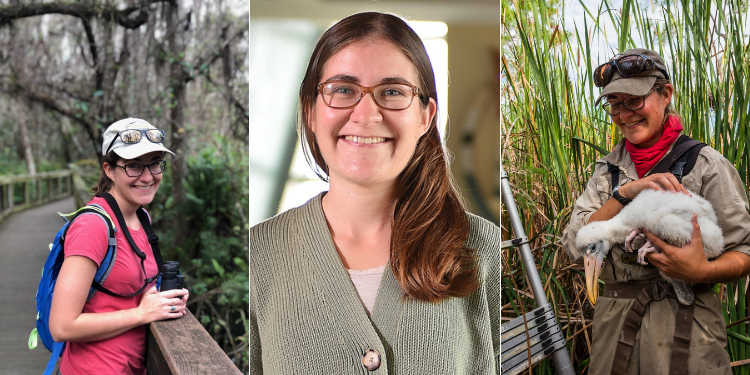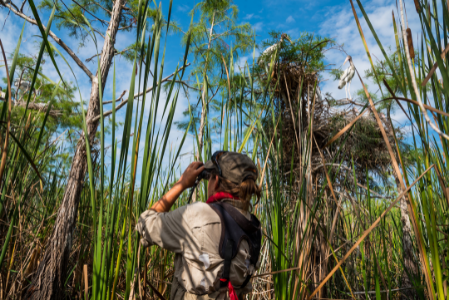 Hometown: Palm Bay, Florida & Greenville, Wisconsin
Hometown: Palm Bay, Florida & Greenville, Wisconsin
Areas of study:
B.A. Human Ecology, College of the Atlantic, Bar Harbor, Maine
M.Sc. Biology, University of New Brunswick, Fredericton, New Brunswick, Canada
Ph.D. candidate Integrative Biology-Environ. Sci., Florida Atlantic University, Boca Raton, FL
Tell us about your background, previous professional experience and research?
I have a broad interest in ecology and conservation, including the human dimensions of these fields. In high school I volunteered at my county’s nature center and worked as a paid intern for the fisheries division of the U.S. Fish & Wildlife Service office in Green Bay, Wisconsin. In college I struck out applying for one of the National Science Foundation’s internship programs and ended up spending the summer at College of the Atlantic’s Alice Eno Field Station on Great Duck Island (Gulf of Maine) instead, which was the best possible turn my life could have taken. I dove deep into the world of natural history, and for the first time took the lead in choosing a research question and designing a project to answer it. Somewhat arbitrarily, I decided that summer to study Herring Gulls (that too-common, nuisance “seagull”) and fell in love. My research has focused on waterbird biology ever since.
Outside of Maine/Atlantic Canada, I have led or participated in three other research projects: a study of land use and conservation in the traditional territory of the Taku River Tlingit First Nation, northwestern British Columbia; ecology of threatened bird populations in the Florida Everglades; and, most recently, avian colony restoration in the Gulf of Mexico.
What led you to apply for the Knauss Fellowship?
I have long understood the importance of policy work to environmental conservation, but shied away from it in college because I judged my skill set to be better suited for the sciences. But the idea of attempting that route has always niggled at me. I was a competitive debater in high school, so have a feel for the kind of rush and interpersonal dynamics that result from seeking resolution on a controversial issue. I will not pretend to know what I am getting myself into during next year’s Knauss Fellowship, but I am certainly excited to see how it unfolds!
 How did you first become interested in marine science?
How did you first become interested in marine science?
My dad was a scientist in his career, and I think I adopted his logical, organized way of thinking quite young. I also went through a period of fascination with Laura Ingalls Wilder’s pioneer life in Little House in the Big Woods, having grown up partly in Wisconsin, and her book inspired me to seek out experiences in wilderness. My career choices have been about exploring ways to combine these facets– the investigative mind and the desire to be in but also protect nature.
What are you most looking forward to about the Knauss Fellowship experience?
I have been in academia for most of my adult life and am very comfortable in that world. Knowing this, I am looking forward to being thrown into a whole new setting, finding out where I sink and swim and experimenting with ways to learn, communicate, and contribute to grand environmental challenges. The Knauss Fellowship is an incredible opportunity for personal growth, and I feel honored and privileged that I will be working on the Hill in the U.S. capitol.
What are your career goals?
Quite simply, my goal is to positively influence environmental conservation. I do not have any one job title or organization in mind, and imagine myself holding a variety of positions over time that are concerned with environmental issues on a range of scales, from my neighborhood, to my nation (the U.S.), to the globe.
What office have you been placed at for the duration of your fellowship and what are your responsibilities?
As a Legislative Fellow, I will either be working for a committee or a personal office in either the Senate or the House of Representatives. Placement Week is in late January.
What’s been the most exciting part of the experience so far?
It is early times yet! So far the two best parts have been chatting with former and oncoming Fellows, and dusting off my knowledge of U.S. civics when tracking the daily news cycle.
Have any advice for future applicants?
One of my role models, a community organizer, always says, “It takes all kinds of people.” I think she is right. We each have experiences, perspectives, and expressions of personality that are unique to us and flavor what we contribute to a group in problem-solving situations. Give yourself the time to explore what this looks like for you. Exploration will help you identify what motivates you, which is key to landing yourself a job you are passionate about. When your heart is in your work, you have the energy and willpower to think outside the box and get stuff done.